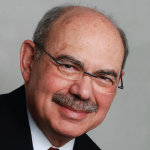
Dr. Monash
But in other settings, including community and small hospitals, rural areas and communities located some distance from academic medical centers, access to a subspecialist can prove difficult. Another factor is the rheumatology group itself: Is it fully staffed? Is it asked to consult at multiple hospitals, each with its own idiosyncratic electronic medical record? What about traffic and parking? How are consulting responsibilities divided up and assigned? What if it is a small group or solo practice, or if the group provides no dedicated time for hospital consults? What does the health system or the employing multi-specialty medical group say about these issues?
The rheumatologist is a cognitive doctor more than a proceduralist, and is a highly accomplished diagnostician, notes Neal Birnbaum, MD, a rheumatologist in practice at the California Pacific Medical Center in San Francisco. “Sometimes it’s easier for us to talk to the hospitalist on the phone instead of just coming in and looking at a chart. When I was starting out in practice, I’d start my clinic hours at 1 p.m. after spending all morning driving from hospital to hospital. Today the average rheumatologist has almost nobody on their inpatient caseload in any given hospital. Trekking over there to see one patient is just not time-productive,” he says.
“I can step away from a patient to take a call from another physician,” Dr. Birnbaum says. “It may save more time to just give the information over the phone rather than in person, but there’s very little opportunity to bill for that kind of interaction. If it happens occasionally, it’s not a problem. You can tell the hospitalist over the phone what lab tests you think are needed. Once the results are available, the patient can be seen either in the hospital or outpatient setting if a face-to-face evaluation is needed.”

Dr. Birnbaum
Dr. Birnbaum adds that the timely availability of a rheumatologic consult can improve diagnosis accuracy while potentially shortening hospital stays and lowering overall costs of care, because the right diagnosis and treatment strategy are reached faster. But are some patients being imperiled today by lack of access to these timely and accurate consultations?
“Your question encouraged me to contemplate these issues,” says Christopher Frost, MD, SFHM, a hospitalist in Nashville, Tenn., and current president of the Society of Hospital Medicine, the professional association for hospitalists. “Multiple specialties are not coming to the hospital as frequently as they did in the past—not just rheumatologists, but also neurologists, dermatologists and endocrinologists. This could be driven by supply and demand, and by doctors asking themselves the question, ‘Where can I have the greatest impact with my time?’
“The foundational key to success has to do with communication, in order to maximize efficiency and relationship effectiveness. How do you hardwire that communication into the relationships? You need to sit down across the table from each other and talk about establishing mutual rules of engagement.” Can the two sides agree on what is urgent, what ought to be standard practice and how consults and discharge planning should be handled? But it must be done proactively, not in a moment of crisis, and the conversation can’t be just one and done, Dr. Frost says. “We both need to shoulder the responsibility of getting needed information to each other.”
He adds that it’s not uncommon for hospitalists to go out and meet with other physician groups (such as primary care physicians) to talk about how to strengthen working relationships. “Rheumatologists would be an excellent group to engage in this type of conversation,” he says.
Effective relationships impact more than just clinical care delivery. They can make huge contributions to the patient’s experience of care, Dr. Frost says. “It’s very powerful for me to say to a hospitalized patient, ‘I am going to communicate with your rheumatologist before you go home.’”
